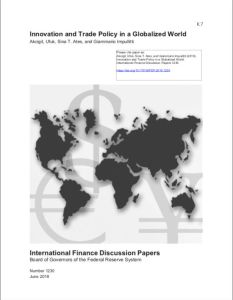Join getAbstract to access the summary!

Join getAbstract to access the summary!
Ufuk Akcigit, Sina T. Ates and Giammario Impullitti
Innovation and Trade Policy in a Globalized World
Federal Reserve Board, 2018
What's inside?
Trade tensions will have significant, long-term effects on global innovation and economic growth.
Recommendation
One point that most economists agree on is that free trade produces long-term benefits for the global economy. In the current geopolitical environment, however, the United States is locked in trade disputes with China, the European Union and others. Economists Ufuk Akcigit, Sina T. Ates and Giammario Impullitti examine the relative efficacy of using tariffs or strategic incentives to bolster nations’ competitive advantage. Policy experts and executives interested in a thorough analysis of this economic carrot-and-stick approach will find important insights in this report.
Summary
About the Authors
Ufuk Akcigit is a professor of economics at the University of Chicago, Sina T. Ates is an economist at the Board of Governors of the Federal Reserve and Giammario Impullitti is a professor at the University of Nottingham.


















Comment on this summary